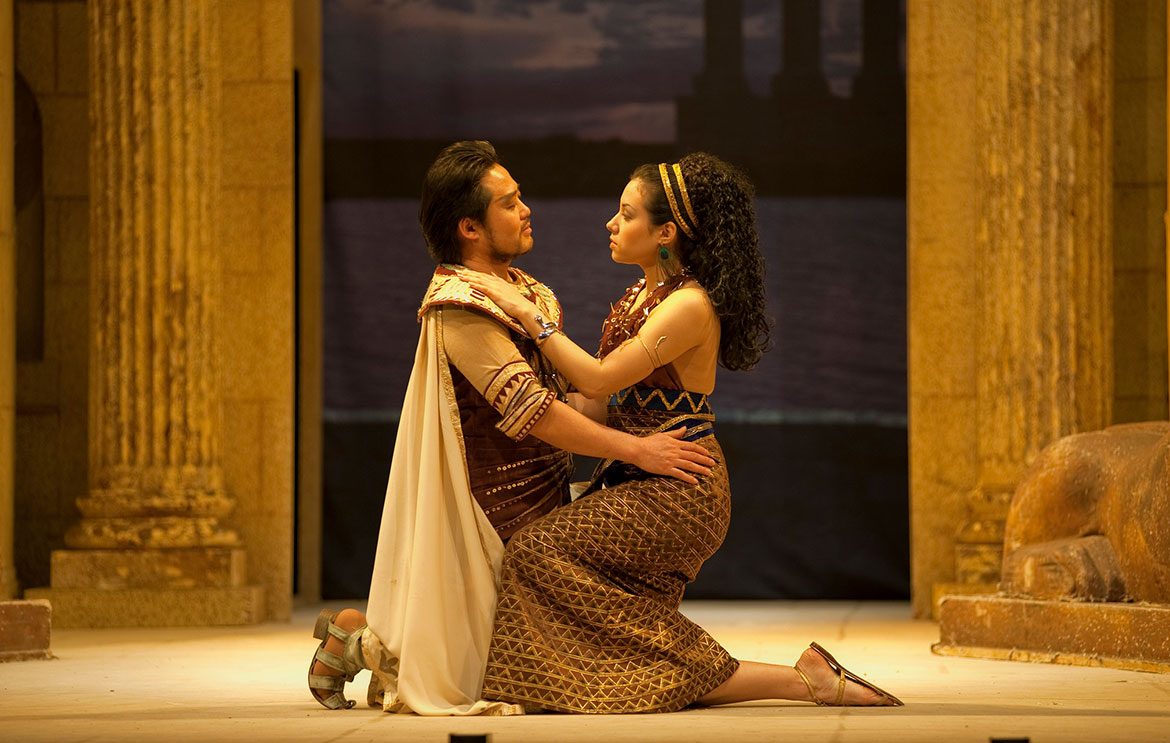An Ellen Kent opera production is always something to look forward to, so it was very sad that Aida was only seen by a half-full house at most.
Kent’s trademarks are the single-night performance, the multi-purpose and impressive set, lesser-known singers, and a popular repertoire – classical operas whose names are familiar, even if their storylines are not.
Aida is set in Ancient Egypt, and is essentially a love triangle complicated by war. Aida, daughter of the King of Ethiopia, is a slave in the Egyptian court at Memphis.
She and the Captain of the Guard, Radames, are deeply in love – but the Princess Amneris also loves Radames, and is insanely jealous of Aida.
When Aida’s father, Amonasro, attacks the city, she is torn between wanting her lover to return safely, and wanting her father to succeed in battle. When Amonasro is captured and brought to the court, Amneris discovers that Aida is his daughter, and denounces Radames as a traitor for planning to run away with her.
The pair are entombed beneath the Temple of Vulcan and left to die, while the princess (perhaps with an attack of guilty conscience) prays for their immortal souls.
Young local talent
There are relatively few named parts in Aida and, as usual, Kent involves local amateur and professional singers and actors for the crowd scenes. I must applaud the children from Stagecoach Theatre Arts York, particularly in Act 2, scene 1.
A group of young ballerinas give a beautiful, poised performance, while a quartet of younger children captivate the audience both with their dancing, and with their play.
Oleksandr Forkushak is an authoritative King of Egypt (bass). As High Priest Ramfis (bass), Vadim Chernihovskyi makes the most of the gorgeous tone of his voice.
Iurie Gisca brings determination and nobility to the role of Amonasro, King of Ethiopia (baritone). Liza Kadelnik, as Princess Amneris (mezzo-soprano), has a very beautiful voice, but it sadly lacks power, and is frequently overwhelmed by the orchestra.

Powerful voices
The real stars of the show – as they should be – are Olga Perrier (Aida, soprano) and Vitalii Liskovetskyi (Radames, tenor). They have clear, powerful voices, perfectly controlled and with beautiful diction. Perrier is even completely audible when knocked to the floor, face down.
They are also both excellent actors. A memorable opera singer should not only be able to sing beautifully, but also to act convincingly. This pair provide a great example of how powerful opera can be when performed by singers who can manage both.
Perrier, especially, turns on a sixpence from full throated anger to quiet anguish, her impressive control and beautiful vocal tone supported by her compelling physical expression of emotion.
The costumes are gorgeous, colourful and sparkling, complete with elaborate head dresses. The stage is set with huge statues of Anubis, and sphinxes, and a deluge of golden confetti completes Act 2, where the King of Egypt rewards Radames’ success in battle with Princess Amneris’ hand in marriage.

Great credit must be given to the Orchestra of the National Opera & Ballet Theatre of Moldova ‘Maria Biesu’, National Philharmonic of Moldova ‘Serghei Lunchevici’, and conductor Vasyl Vasylenko, for a flawless performance. There really is nothing like live music.
An Ellen Kent production is an excellent introduction to opera. Everything looks wonderful, her singers almost always have beautiful diction, and there are surtitles above the stage, translating everything into English.
If you’ve never tried live opera before, do consider giving it a go – the next Ellen Kent offering is Nabucco on Monday, November 28th at the Grand Opera House.
